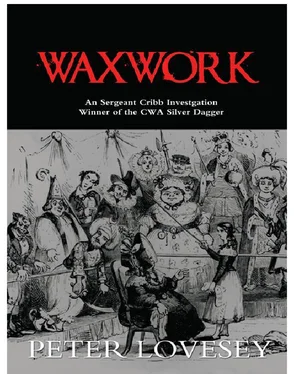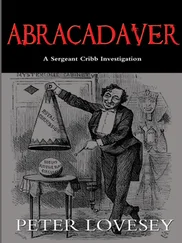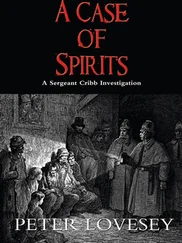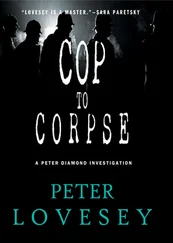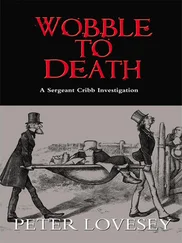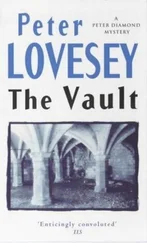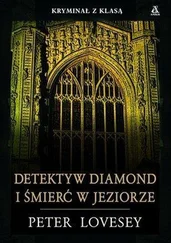Peter Lovesey - Waxwork
Здесь есть возможность читать онлайн «Peter Lovesey - Waxwork» весь текст электронной книги совершенно бесплатно (целиком полную версию без сокращений). В некоторых случаях можно слушать аудио, скачать через торрент в формате fb2 и присутствует краткое содержание. Жанр: Исторический детектив, на английском языке. Описание произведения, (предисловие) а так же отзывы посетителей доступны на портале библиотеки ЛибКат.
- Название:Waxwork
- Автор:
- Жанр:
- Год:неизвестен
- ISBN:нет данных
- Рейтинг книги:3 / 5. Голосов: 1
-
Избранное:Добавить в избранное
- Отзывы:
-
Ваша оценка:
- 60
- 1
- 2
- 3
- 4
- 5
Waxwork: краткое содержание, описание и аннотация
Предлагаем к чтению аннотацию, описание, краткое содержание или предисловие (зависит от того, что написал сам автор книги «Waxwork»). Если вы не нашли необходимую информацию о книге — напишите в комментариях, мы постараемся отыскать её.
Waxwork — читать онлайн бесплатно полную книгу (весь текст) целиком
Ниже представлен текст книги, разбитый по страницам. Система сохранения места последней прочитанной страницы, позволяет с удобством читать онлайн бесплатно книгу «Waxwork», без необходимости каждый раз заново искать на чём Вы остановились. Поставьте закладку, и сможете в любой момент перейти на страницу, на которой закончили чтение.
Интервал:
Закладка:
‘I don’t see where the problem is, sir.’
‘Presently you will. Consider what happened when Miriam Cromer returned to the house. The dying man had been discovered, the alarm raised and the doctor was already there. He recognised the symptoms of cyanide poisoning’-gratuitously, Jowett said-‘the smell of bitter almonds and the bluish colouring of the skin-and asked Mrs Cromer where the bottle was kept. She states in her confession that she unlocked the cabinet and showed it to him. Now, Sergeant.’ Jowett leaned back in the chair with his arms folded. ‘I have always had you down as a practical thinker. If Miriam Cromer is to be believed, what would you infer that she needed to possess to carry out her actions?’
Cribb gave a shrug. To be labelled a practical thinker was a back-handed compliment. ‘A key?’
‘The logical assumption,’ Jowett confirmed. ‘To put you properly in the picture I should explain that the poison cabinet was nothing like the simple wooden box you and I have in our bathrooms-’
‘There’s no bathroom here,’ Cribb pointed out.
‘That has no bearing on it, Sergeant. I was saying that this was a cabinet of German manufacture, built of steel, with a lock no ill-intentioned individual could force. Cromer was admirably responsible about the storage of his chemicals. He was well aware how dangerous cyanide can be and he was determined there should be no accidents. He insisted that all poisonous substances were locked in the cabinet whenever they were not in use. There were two keys. One he kept for himself and wore on his watch-chain with the idea that he would never leave it lying about. It was small and silver in colour and looked quite as handsome on an albert as a lucky sixpence. The other key was given to Perceval. He had it on a key-ring with his personal keys, which he kept in his pocket. They were among the list of articles found on the body. Do you see the significance? If Miriam Cromer is to be believed, on the day she murdered Perceval she was in possession of one of those two keys.’
‘Her husband’s?’ suggested Cribb. ‘He was in Brighton, so he wouldn’t have wanted it.’
‘A reasonable inference,’ Jowett said with a tolerant nod. ‘She could have slipped it off the watch-chain at some time when Cromer was not wearing his waistcoat, perhaps early in the morning, before he was up. Perfectly possible. Now examine this.’ With the air of a conjurer one trick ahead of his audience, Jowett took a piece of paper from an inside pocket and handed it to Cribb.
It was a photo-engraving cut from a magazine. Two men in bowler hats were shown standing at the entrance of what looked like a hotel. The caption read: ‘The Annual Conference of the Portrait Photographers’ League, at Brighton, on 12th March. The Hon. P. R. Deacon-Pratt, President and Mr H. Cromer, Vice-Chairman.’ The date and Cromer’s name were ringed in red ink. More significantly, an arrow had been drawn pointing to the waistcoat of the figure on the right. A key, small, but clearly visible, was shown attached to the watch-chain looped across the front.
‘It was cut from the Photographic Journal of 24th March,’ said Jowett. ‘The Home Secretary received it on Monday. It came in an envelope with a West Central postmark. There was no letter of explanation.’
‘An explanation isn’t necessary,’ said Cribb. ‘Someone studied Miriam Cromer’s confession and remembered this. There’s no doubt, I take it, that this is one of the keys to the poison cabinet?’
‘No doubt whatsoever. The Home Office have studied it minutely. I saw it myself under magnification and compared it with the key found in Perceval’s pocket. The Germans are clever locksmiths, Cribb. That key and its twin were individually cut for the lock on that cabinet. The pattern is intricate, make no mistake. Triple layers of metal, divergent faces-jargon to me, but it means we can eliminate the possibility of a copy having been made.’
‘Well, as Cromer was wearing one key on his waistcoat in Brighton, his wife must have opened the cabinet with the other. Is it possible Perceval mislaid it?’
Jowett shook his head. ‘I just mentioned, didn’t I, that it was on a ring with his other keys. If Perceval had mislaid them, he could not have let himself into the studio that morning. I am assured he did.’
Cribb’s mind sifted through possibilities. ‘If he removed his jacket while he was working with chemicals-’
‘He kept the key-ring in his trouser pocket. It was found there on the body. And we can discount the possibility that she simply asked to borrow his key to the cabinet. That would have alerted him to her intention. She had no conceivable reason for opening the cabinet except to obtain poison. Perceval was no fool, Cribb. He was well aware of the risk he ran in blackmailing her. He was too astute by far to present her with the means of destroying him. Let’s not forget, either, that Miriam Cromer claimed to have taken the poison from the cabinet at lunch time, when Perceval was out. When she saw him next, he was a dead man. If she used Perceval’s key to obtain the poison, how did she return it to the pocket of his trousers after he was dead?’
Cribb thought for a moment. ‘Just a minute, sir. You said just now that when the doctor asked about poison, Miriam Cromer unlocked the cabinet and showed him the bottle of cyanide. She must have had a key in her possession.’
Jowett knocked ash into Cribb’s coal-bucket. ‘Obviously you are coming to grips with the problem, Sergeant, but the answer isn’t there, I’m afraid. You see, I am at a slight advantage here. I have read Dr Eagle’s deposition. He states categorically that when he inquired about the cyanide, Mrs Cromer told him the bottle was kept locked in the poison cabinet. He asked to see it and she said she would need Perceval’s key to open it. The doctor himself removed the keys from the dead man’s trouser pocket. Afterwards he replaced them. The whole thing defies rational explanation.’
‘Has anyone asked Miriam Cromer about it?’
‘No.’
‘Why not? She pleaded guilty. She of all people knows what happened.’
‘No, it wouldn’t do.’
Cribb rubbed his chin, surprised that a straightforward suggestion should be rejected out of hand.
‘She could tell us, yes,’ Jowett admitted. ‘I cannot fault your logic, Sergeant, but it would be most inappropriate to question Mrs Cromer at this time. Consider her situation. She is condemned to hang twelve days from now. The only thing that can save her is a reprieve. Doubtless she wrote her confession in the hope that it would entitle her to a measure of sympathy. The circumstances of the blackmail were distressing to read, were they not? Here was a decent woman driven to murder through one rather absurd lapse exploited by a vicious blackmailer. On the face of it, there are grounds for mercy. I say on the face of it because her own account is the only one we have. It was accepted by the court because she pleaded guilty and it fitted the available facts. The court had to decide the question of her guilt and she saved them the trouble. Why? In order to give her own account of what happened in the most favourable version possible-else why did she forfeit the right to be defended by an able counsel?’
‘It was a gamble, you mean?’
‘A gamble for her life, Cribb. At this moment Miriam Cromer is sitting in the condemned cell waiting to see if she has won. Now do you understand why it is out of the question to tackle her about this business of the key? If you or I visited her in Newgate and told her fresh information had come to light, imagine the effect. She would at once conclude that her confession was in doubt-that confession on which she has pinned her hope of a reprieve. It would have a most unsettling effect. The prison staff have difficulty enough calming the minds of the condemned. No, it can’t be contemplated, not merely to clarify a detail. The Home Secretary would refuse to sanction it.’
Читать дальшеИнтервал:
Закладка:
Похожие книги на «Waxwork»
Представляем Вашему вниманию похожие книги на «Waxwork» списком для выбора. Мы отобрали схожую по названию и смыслу литературу в надежде предоставить читателям больше вариантов отыскать новые, интересные, ещё непрочитанные произведения.
Обсуждение, отзывы о книге «Waxwork» и просто собственные мнения читателей. Оставьте ваши комментарии, напишите, что Вы думаете о произведении, его смысле или главных героях. Укажите что конкретно понравилось, а что нет, и почему Вы так считаете.
